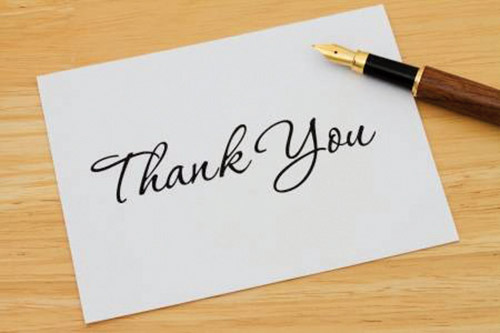
My mother used to tell me when I received a gift or if someone did something nice for me: “Always remember to say ‘Thank you.’” Didn’t your mother or parents do the same? When you are a little child, and growing up, this response just becomes a natural one and it becomes something you do by rote. It’s automatic. Or it should be. Little did I know then just how important such an innocuous message becomes later in life.
Rabbi Berel Wein once wrote, “One of the cardinal principles of Judaism is gratitude—the necessity and ability to say thank you.” In fact, he continues, “Jews begin their day with two words—Modeh Ani—I acknowledge and thank you God for having given me the gift of life once more as I awake to the new day.” This is perhaps the ultimate thanks we can give.
Rabbi Wein admonishes those who don’t follow this integral path in our Jewish heritage. He states unequivocally, “I am aware of fundraisers who feel no gratitude towards donors who somehow contribute less than the amount asked for or expected.” In emulating his mentor in fundraising, Rabbi Wein concludes, “He would say ‘thank you’ to every donor with the same fervor and sincerity.” And so should we.
Over the years, I learned that whether or not the donor contributed, or whether the level of gift was commensurate with ability, you always say ‘Thank you.’ It has to be genuine, from the heart and sincere. One never takes for granted a kindness done by another person. Otherwise, also expect the donor to “lower the bar” further next time or even decline to meet or consider a gift. Worse yet, as a Jew, you run the risk of committing a “chilul Hashem”—desecrating God’s name and disgracing the organization you represent or even fellow Jews.
So, how does one say thank you to donors, or even prospects for giving? Of course, there are the conventional ways of doing so, including a heartfelt verbal expression of thanks, a written letter or a phone call. Today, things have changed somewhat and, depending on the level of gift, folks might get a text, an email or some other thanks via modern technology such as WhatsApp. I foresee holographic projections in the future. Not so farfetched.
All of this presumes that we wait to thank a donor retroactively. What about being proactive and reaching out to donors or prospects prospectively? What? Thanking contributors before they give?! That’s right. We live in a highly competitive fundraising environment and the nonprofit organization that thinks forward and creatively will be more successful than the one that is complacent and believes these things take care of themselves. They don’t.
One important method of saying thanks is called the “5-10 Contact Points each day.” I try to call 5-10 folks on my donor list every day to see how they are doing, give them a short progress report on my nonprofit or just acknowledge their past support. Imagine the donor’s surprise that I did not call them to solicit a gift. Just wanted to say thank you. The donor appreciates that I don’t just look at them as “Mr. or Mrs. Moneybags” but acknowledge their friendship, which is priceless.
Another proactive way to thank donors is to recognize their name, or insert a picture, in your newsletter, annual report or other house organ for something other than a gift. Sometimes this requires a donor’s permission. They may want to remain anonymous. But, that’s okay. It’s the thought that counts and they will appreciate that you consulted them and wanted to acknowledge their generosity.
Clearly, there are more traditional methods of recognizing your donors. A commemorative plaque on a wall, asking them to be an honoree at a special event and naming a program after the philanthropist are just some of the ways to say thank you. How many ways can you say thank you? Unlimited.
My mother, and probably your parents, was prescient when she inculcated in us the need to thank generosity and kindness in turn. As Rabbi Wein indicates, “The attitude of gratitude must always be present and must always find expression in actual deeds.” This holds true for donors and for each other.
By Norman B. Gildin
Norman B. Gildin has fundraised for nonprofits for more than three decades and has raised upwards of $92 million in the process. He is the National Director of The Aleph Institute. A resident of Teaneck for 34 years, he now resides in Boynton Beach, Florida, and can be reached at Norman@Aleph-institute.org













